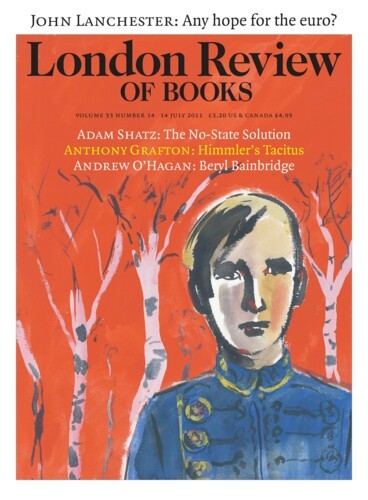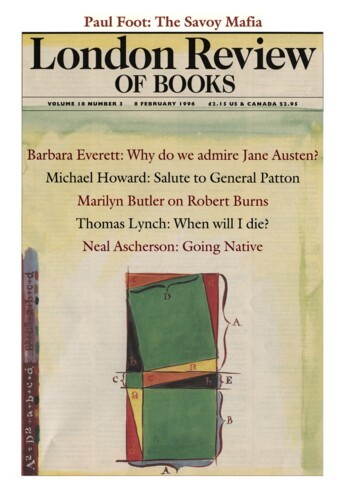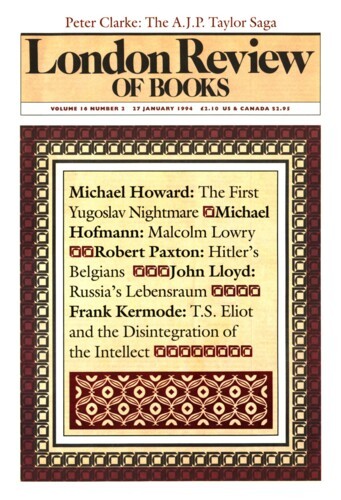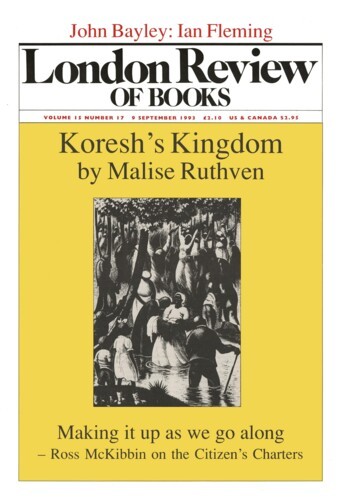Michael Howard
Michael Howard is Regius Professor of Modern History at Oxford and the author of Clausewitz on War and War in European History, among other books. A memorial to the poets of the First World War was unveiled at Poets’ Corner in Westminster Abbey on 11 November. Michael Howard spoke on this occasion and the words of his address appear in this issue.
Over the Top
Michael Howard, 8 February 1996
‘Mad, is he?’ George II is reported to have said of General Wolfe; ‘Then I wish he would bite some of my other generals!’ Both remarks might have been made about General George S. Patton Jr, and no doubt frequently were. His sanity was seriously in question. As S.L.A. Marshall, the most judicious of American military historians, put it: ‘Any man who thinks that he is the reincarnation of Hannibal or some such isn’t quite possessed of all his buttons.’ But this was exactly what Patton did think, and was not even half of it. ‘He declared that he had once hunted for fresh mammoth, and then in other ages had died on the plains of Troy, battled in a phalanx against Cyrus the Persian, marched with Caesar’s terrible Tenth Legion, fought with the Scottish Highlanders for the rights and hopes of the House of Stuart, [fallen] on Crecy’s field in the Hundred Years War, and [taken] part in all the great campaigns since then.’
Uniquely Horrible
Michael Howard, 8 September 1994
After the First World War Germany was compelled by the victorious Allies to accept full responsibility for the war, and in consequence to pay all the costs. In spite of the work of Fritz Fischer and his associates, few historians would now claim that this was fair. To the German people at the time it seemed outrageous. Their outrage was to be a major element in the revanchism so ably exploited by Hitler in his rise to power, and in the remorse that paralysed so much of British enlightened opinion when it came to dealing with him.
Dangerous Liaison
Michael Howard, 27 January 1994
In May 1945 I was serving with a battalion of the British Eighth Army in victorious occupation of Gorizia, some thirty miles north of Trieste. We shared the town with a brigade of Yugoslav Partisans, and the relations between us were not good. Our lords and masters had decreed that the Partisans should be, for the time being, in charge of civil administration, while we confined ourselves to military duties. So while our drill-sergeants were trying to turn us back into proper soldiers on the barrack-square, the Yugoslavs spent the days plastering the town with peremptory orders and warnings, and by night carried out what would now be termed ‘ethnic cleansing’: sending out patrols to arrest the leading members of the Italian community, partly to revenge themselves for the treatment which the Slovene peasantry had suffered during Italian occupation, partly to ensure a favourable ethnic balance in this disputed region if it ever came to a referendum. My own landlord, a gentle Italian doctor, was dragged from his bed in the middle of the night by a Partisan patrol commanded by a pleasant-faced boy even younger than I was, who told me when I protested that the doctor was on the list of notorious war-criminals. For all I know, he was. In any case, when I rang my commanding officer to ask for instructions, that admirable man told me to go straight back to bed unless I wanted to start a Third World War. So I did, and, thankfully, a few weeks later left the region for good. If that was what the peace would be like, I reflected, there was more to be said for war than I had previously realised.
UN in the Wars
Michael Howard, 9 September 1993
‘Peacekeeping’ as such was almost unheard of when the United Nations was established in 1945. Certainly it found no place in the original UN Charter. Peace, it was then assumed, would be maintained by settling disputes peacefully, and for that the UN would provide good offices under Chapter VI. ‘Threats to peace’ would come from overt acts of aggression such as were fresh in the minds of all who assembled in San Francisco to draft the Charter in April 1945, and for these Chapter VII made provision. They would be dealt with either by economic and other ‘sanctions’ of the kind that had been unsuccessfully attempted against Italy during the Abyssinia crisis of 1935, or by joint military action such as the League of Nations had so disastrously failed to take in time against Nazi Germany. For that, the wartime Grand Alliance would be reactivated under the aegis of a Military Committee which would effectively be the wartime Combined Chiefs of Staff under another name.
Pieces about Michael Howard in the LRB
The Forty Years’ Peace
Keith Kyle, 21 October 1993
Early in 1983, when the newly founded Social Democratic Party was acquiring policies by holding study groups, one of these was devoted to East-West relations. At its first session a musty-looking...
Desolation Studies
Edward Luttwak, 12 September 1991
I still recall my acute disappointment with Michael Howard’s The Franco-Prussian War, published some thirty years ago. The subject was exciting – what with the desperate German...
Righteous Turpitudes
Basil Davidson, 27 September 1990
Ever since the Trojan Horse, the telling of lies in wartime has been found honourable, along with the bedevilment of enemies and the invocation of gods, and has been practised more or less...
Boom
Arthur Marwick, 18 October 1984
‘With others of my own contemporaries,’ Denys Hay once wrote, ‘I certainly found myself in the years after 1945 still preoccupied with aspects of warfare in other times (in my...
Rules of the Game
Jon Elster, 22 December 1983
Raymond Aron died of a heart attack on 17 October, a few weeks after the publication of his memoirs. He died on the steps of the Paris courthouse where he had been testifying on behalf of his...
Read anywhere with the London Review of Books app, available now from the App Store for Apple devices, Google Play for Android devices and Amazon for your Kindle Fire.
Sign up to our newsletter
For highlights from the latest issue, our archive and the blog, as well as news, events and exclusive promotions.





